Scroll through the lesson and click on notation/video/audio links to load the interactive players.
Please subscribe to get full access to all lessons for only $7.95/month PLUS 1 week free trial.

Riff Interactive lessons are
LESS expensive and
MORE interactive than alternatives!
More Info
|
|
| Lesson Subject:
Rockabilly Legends |
| What you learn:
Duane Eddy Style |
| Teacher: Michael Johnson |
Michael: This interactive lesson is on the
style of Duane Eddy, or otherwise known as the "King of '50s Twang Guitar"! Duane Eddy influenced many
guitarist who made a profound impact on instrumental guitar. He influenced the
whole surf movement and many rockabilly guitarists. He was the
guitarist who played the "Peter Gunn" theme. Here's a sample of the licks you'll
learn:
Michael: Notice the simple lead
lines. This is a
great lesson for beginners lesson to understand how to play solos and fun for the rest
of us. Our first scale is in E Major:
Michael:
This is
a basic scale, the progression will be based on the E I, IV & V. Do any of
you know which chords make up that progression?
Rhinosaur: E A B
Michael:
Thanks Rhino, here's the jam track for
our first set of licks.
Looping Jam Track 1
Michael:
Notice the jam track has a rockabilly and country
type beat. Duane would use the country sound, but added his rock 'n' roll twist
with the bends. Here's our first lick:
Bending the 6th String
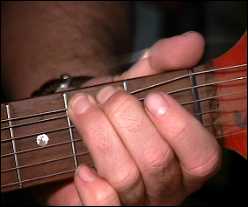
Michael:
Notice how I use my 3rd and 2nd finger
to support it for the bend. You take a simple melody using the E Major scale.
Notice the guitar tone used, do you know what effects I'm
using?
Ginger: Reverb & echo
Paula:
Fuzz box and echo?
Michael:
Close, I'm using a clean guitar tone with a tremolo and
reverb effect. That's a signature sound for many guitarists of
the '50s rockabilly and surf guitar.
Paula: Twangy guitar sound!
Michael:
Yep, a good old Fender sound, but......
Duane Eddy actually used a 6120 Gretsch hollow-body guitar, just like Brian
Setzer. Here's our next lick:
Michael:
Another simple variation on the E Major scale, now let's try to play over the
chord progression. The next licks will follow the root notes of the E I, IV, V
progression: E (I), A (IV), E (I), B (IV), E.
(I)
Michael:
The chord changes are shown in the tab. Try playing this over the looping
jam track and catch all the progression changes. Now let's try another
version:
Michael:
The licks uses a slide which add a cool spin to the licks. Now let's add a few
chords in between the licks.
Skedman:
Yee
haw!
Michael:
You bet!!! You repeat the same
intervals in between the licks, you can hear the root note change with the
progression, you repeat the same basic intervals until you play the B7 on the V
of the progression. It can be a little tricky to switch between both parts
(chords/licks), but it fills the sound of the progression. Let's try
another:
Michael:
This lick has a different approach to the progression, but it's the same concept of
playing chord intervals over the progression.
Position 1
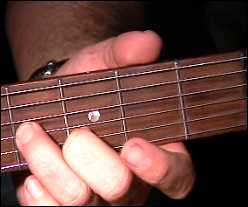
Position
2
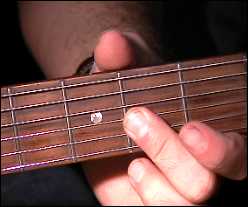
Position 3
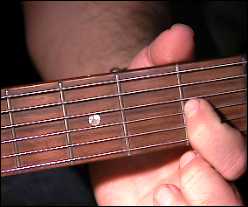
Michael:
Here's the basic fingerings for the open
E position, now let's shift to the E Minor. The minor was used in Peter Gunn,
here's a jam track using the style of that lick:
Looping Jam
Track 2
Michael:
Now we'll play minor based licks and
chords over this progression.
Michael:
Simple, but effective intervals.
Position 1
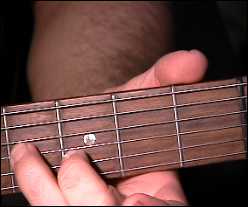
Position
2
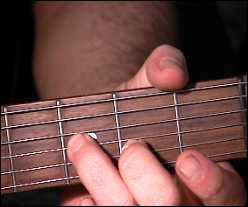
Position
3
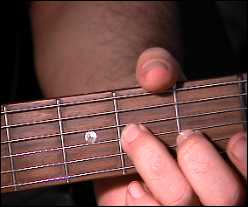
Position 4 -
E Minor Chord
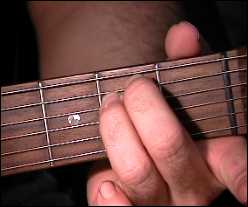
Michael:
You just hold the same fingering and
pick, then strum the E min chord at the end. Notice I strum the E min from the
little string and up.
Michael:
Here's another variation, you can play licks in the E minor scale then strum the
E min. You can also play chord variations over the progression. Here's a few you
can try:
Michael:
Here's the fingerings.
E Minor
Chord
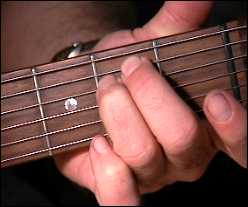
E Augmented
Chord

E Min
6
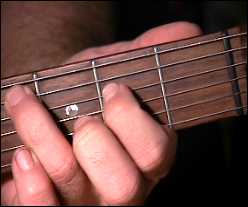
Michael:
Make sure you play these over the last
jam track, how do you like these
licks?
mehl: Nice and twangy!
GFSalles: Very
nice!
Michael:
You bet, this next one uses the add9 for
the first chord.
Michael:
This fits nicely over the bass/drums.
E Minor add9
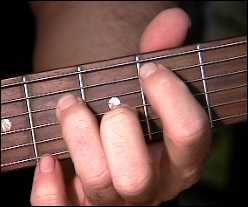
E #5 add9
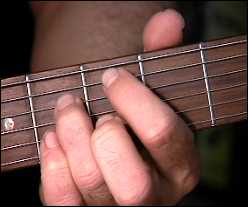
E 6/9
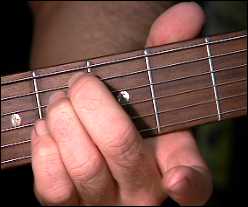
Michael:
Pretty simple chord change as you see. I look forward to seeing you all next
lesson and practice
hard!!!
|
<< load notation from left
|
|
<< load audio from left
|
<< load audio from left
|